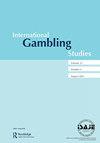Letter to the editor: problem gambling in phenomenological psychopathology
IF 2.5
3区 心理学
Q2 SUBSTANCE ABUSE
引用次数: 2
Abstract
To the Editor, I would like to thank you for the work that the International Gambling Studies is doing. The interdisciplinary horizons of the research contribute to have new aspects to better understand the phenomenon of gambling. In this regard, I intend to present phenomenological psychopathology to study the problem gambling. This approach, which aims to deepen the links between mental disorders and subjective experiences, helps to make sense of psychic suffering and the relationship that the individual has with the world (Stanghellini et al., 2019). Until now, natural science and psychology have studied substance-related disorders and behavioral addiction as gambling starting from the impulsive stresses that connote the psychophysiological state of addiction. Behavioral addiction has been defined as a behavioral disorder and it was not included among the substance-related disorders, even though it shares some characteristics as the direct activation of the brain reward system (American Psychiatric Association, 2013). This classification emphasized the study of the body as an organism and, thus, the above phenomena were classified under the term addiction. Addiction (Oxford English Dictionary, 2008) derives from the Latin addictus, a term used in ancient Rome to indicate a state of slavery. Thus, for science, the person who exhibits these behaviors is considered mainly as a slave to his impulses. Following the preceding considerations, I intend to combine the natural scientific view with phenomenological psychopathology, which aims to study the body as a lived body (Leib) and not as a mere organism (Körper). In this way, it becomes possible not only to fully explain (Erklären) but also to understand (Verstehen) the behavioral addiction of gambling. In explaining, problem gambling is represented by laws or theories that, like physiology, search for causes, while understanding this phenomenon means searching for the meaning (Bedeutung) (Jaspers, 1964) that the single gambler attributes to it . Phenomenological psychopathology offers psychology a way to broaden its view of gambling. Going beyond what logical empiricism offers, phenomenological psychopathology proposes to investigate, above all, the intentionality of consciousness of a being-in-the-world (Heidegger & Von Herrmann, 1977), that is, of an individual who is constitutively related to the world. This is a crucial point in understanding the shift that takes place from the state of being-thrown (Ge-worfen) to that of being-projected (Entworfen) to make the world inhabitable. In other words, the phenomenological approach emphasizes the importance of the existentials a priori that characterize an individual, i.e. the matrices that represent the possible ways in which the individual relates to the world (Heidegger & Von Herrmann, 1977). This method requests two conditions: 1) to go beyond the subject-object relation INTERNATIONAL GAMBLING STUDIES 2021, VOL. 21, NO. 3, 537–541 https://doi.org/10.1080/14459795.2021.1918209致编辑的信:现象学精神病理学中的问题赌博
对于编辑,我要感谢你为国际赌博研究所做的工作。跨学科的研究视野有助于从新的方面更好地理解赌博现象。在这方面,我打算用现象学的精神病理学来研究赌博问题。这种方法旨在加深精神障碍和主观体验之间的联系,有助于理解心理痛苦以及个人与世界的关系(Stanghellini等人,2019)。到目前为止,自然科学和心理学已经将物质相关障碍和行为成瘾研究为赌博,从暗示成瘾心理生理状态的冲动压力开始。行为成瘾被定义为一种行为障碍,它不包括在与物质相关的障碍中,尽管它与大脑奖励系统的直接激活有一些共同的特征(美国精神病学协会,2013)。这一分类强调了对身体作为一个有机体的研究,因此,上述现象被归类为成瘾一词。成瘾(牛津英语词典,2008)源自拉丁语addictus,这是一个在古罗马用来表示奴隶制状态的术语。因此,对于科学来说,表现出这些行为的人主要被认为是他的冲动的奴隶。在上述考虑之后,我打算将自然科学观与现象学精神病理学相结合,后者旨在研究身体作为一个活的身体(Leib),而不仅仅是一个有机体(Körper)。这样,不仅可以充分解释(Erklären),也可以理解(Verstehen)赌博的行为成瘾。在解释中,问题赌博是由法律或理论来代表的,这些法律或理论与生理学一样,寻找原因,而理解这种现象意味着寻找单个赌徒赋予它的意义(Bedeutung)(Jaspers,1964)。现象精神病理学为心理学提供了一种拓宽其赌博观的途径。超越逻辑经验主义所提供的,现象学精神病理学提出,最重要的是,研究世界上存在的意识的意向性(Heidegger&Von Herrmann,1977),即与世界构成联系的个人的意向性。这是理解从被投掷状态(Ge worfen)到被投射状态(Entworfen)的转变的关键点,以使世界可居住。换言之,现象学方法强调了表征个体的先验存在论的重要性,即表示个体与世界联系的可能方式的矩阵(Heidegger&Von Herrmann,1977)。这种方法需要两个条件:1)超越主客体关系《国际博弈研究2021》,第21卷,第3期,537–541https://doi.org/10.1080/14459795.2021.1918209
本文章由计算机程序翻译,如有差异,请以英文原文为准。
求助全文
约1分钟内获得全文
求助全文

 求助内容:
求助内容: 应助结果提醒方式:
应助结果提醒方式:


